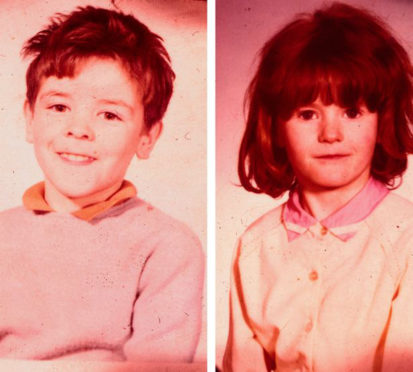
A double child killer has launched a personal plea for release from a secure unit just eight months after being told he’s too dangerous to be freed.
The sister of Alex Millar’s young victims will give evidence after being notified he has appealed for “discharge into the community”.
Millar, 72, has been held in secure psychiatric care since he bludgeoned siblings John, 13, and Irene McMonigle, 12, to death with a hammer in 1976 in a crime that shocked Scotland.
The double killer was told by a mental health tribunal in March that he must remain detained “in order to protect any other person from serious harm”.
Liz McMonigle who, along with her dad, discovered the bodies of her brother and sister, said: “We cannot believe we are having to go through this again so soon after his last appeal.
“The distress it causes us is immense and it takes its toll on your mental and physical health.
“I have been asked if I wish to represent myself at the tribunal. I will hopefully do this but I shouldn’t have to.
“I lost my dad last year and he had been with me every step since it happened.
“He was ill but was comforted knowing Millar wasn’t free.
“If this individual was released, I think it would finish the family off. The system is so unfair on us.”
Millar is currently being held in a secure psychiatric unit in Ayrshire after spending almost 30 years in the State Hospital near Carstairs, South Lanarkshire.
He attended a gardening scheme in Ayr in 2012 as part of attempts to reintegrate him into society but has subsequently been denied four appeals on the grounds that he remains a danger.
Liam Kerr, Scottish Conservative Shadow Justice Secretary, said: “The system of appeals should be able to respond better to the needs of the victims and their families.
“Given the previous verdicts, it seems clear these appeals will result in nothing but trauma for his victims’ families.
“There should be a way that his victims’ families are spared these increasingly frequent ordeals.
“A solution that keeps this man locked up forever, without having to disturb family members again, would certainly achieve that.”
The law was changed about 15 years ago to ensure restricted patients – offenders with a mental disorder – are referred to a tribunal by Scottish ministers every two years.
They can order no change, or a conditional or complete discharge into the community. But patients themselves can also apply once a year to be discharged.
Millar’s last appeal of this type was in 2013. His restriction order allows for him to be held in secure care without limit of time. He tied up John and Irene, gagged them and beat them to death after breaking into their house in Govan, Glasgow, in January 1976 to steal a TV. He also indecently assaulted Irene.
He was charged with murder but admitted culpable homicide on the grounds of diminished responsibility. Judge Lord Wheatley described his crimes as “most terrible”.
The Scottish Government said: “We’re unable to comment on individual cases due to patient confidentiality.”

Enjoy the convenience of having The Sunday Post delivered as a digital ePaper straight to your smartphone, tablet or computer.
Subscribe for only £5.49 a month and enjoy all the benefits of the printed paper as a digital replica.
Subscribe